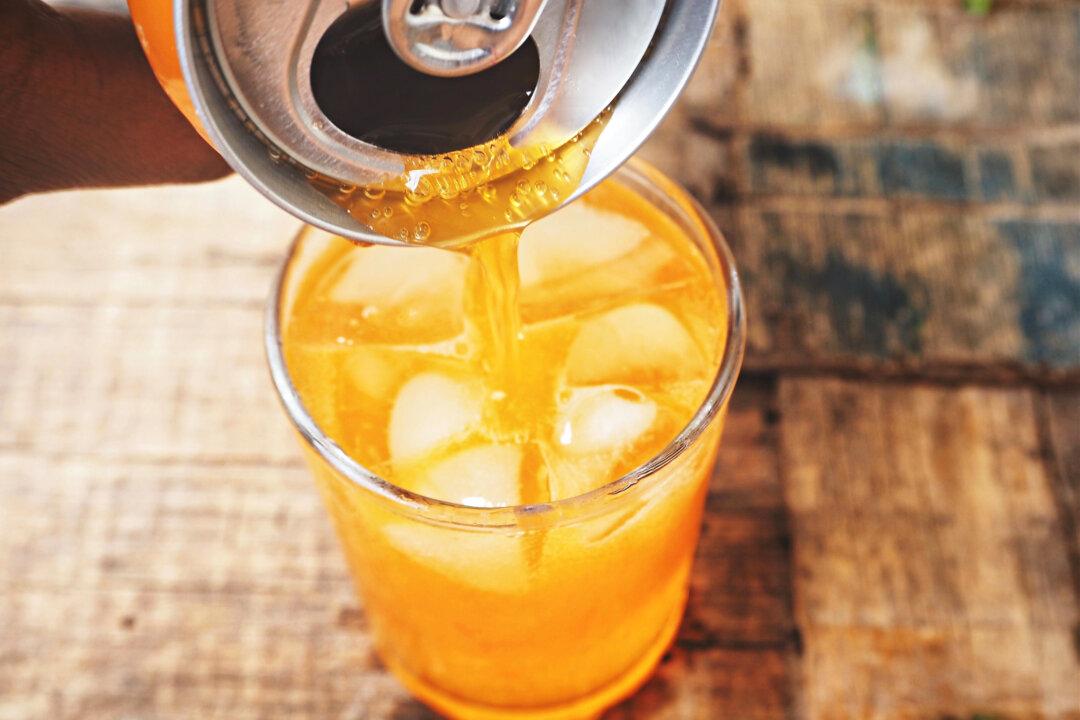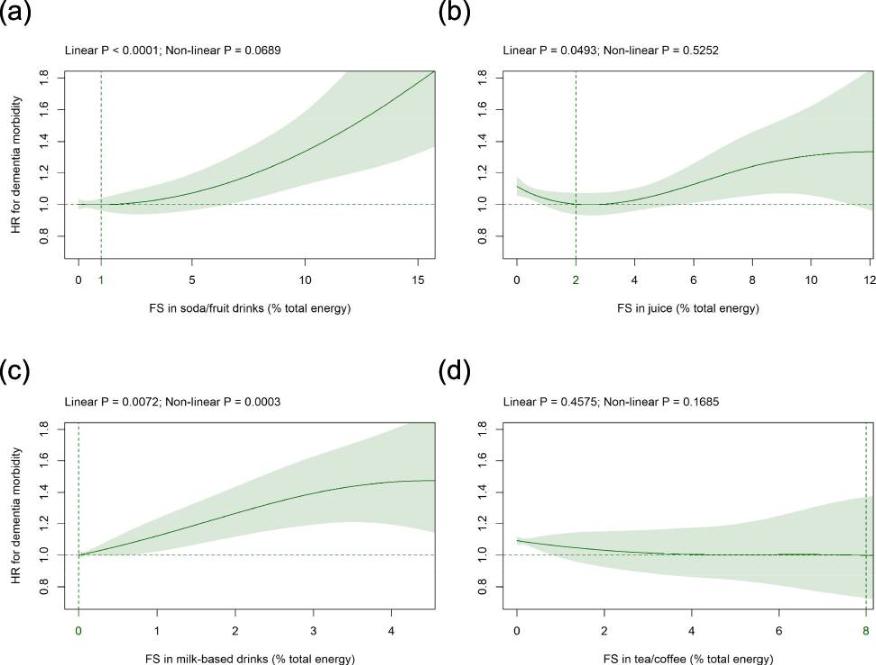
Well maybe.
It all comes down to sugar water which needs to be taken out as much as possible. We already know that our tastes will adjust properly.
The fact is that we abuse sugar often because it is the cheapest fix for a flavor issue. adding sugar to fruit vinegar is rubbish when what you are supposed to do is dilute it. just what do you think the romans did? a glass of water with a shot of fruit vinegar adds excellent flavor and a slight tang to the drink.
you never want it too strong unlike wine itself. We have never learned how to use it properly.
Doing research like this is blinded by the sugar background in all our processed foods.
Drinking These 3 Types of Beverages Increases the Risk of Dementia
A study found that sugary drinks including soda, fruit drinks, and milk-based drinks are related to the risk of dementia.
(successo images/shutterstock)
By Ellen Wan
The number of dementia patients is steadily rising, with nearly 10 million new cases added each year. Currently, approximately 55 million people worldwide are affected, with a higher prevalence observed in individuals aged 65 and above. Dementia prevention is crucial, and modifying lifestyle factors such as diet remains an essential method to delay the decline in cognitive function.
A German study, published in Nutrition Journal in September, found an association between the regular consumption of three common sugary beverages in daily life and the risk of dementia. Specifically, the intake of free sugars (FS) in beverages can increase the risk of dementia by up to 39 percent.
Free sugars refer to monosaccharides (e.g., fructose and glucose) and disaccharides (e.g., sucrose or table sugar) added to food and beverages by manufacturers, cooks, or consumers. They also include sugars naturally present in syrups, honey, fruit juices, and fruit juice concentrates.
To investigate the impact of the intake of sugars from different sources on the risk of dementia, the research team analyzed dietary questionnaire data from 186,622 participants in the UK Biobank cohort. The questionnaire covered the consumption of 206 types of food and 32 types of beverages, with a mean follow-up period of 10.6 years.
The results revealed a significant J-shaped association between the intake of free sugars and intrinsic sugars and the risk of dementia. However, the association between free sugars in solid food and the risk of dementia is not significant. Upon assessing beverage subtypes, it was found that free sugars in soda, fruit drinks, and milk-based drinks are positively related to the risk of dementia. In contrast, free sugars in tea and coffee show minimal impact on dementia risk.

(Source: Nutrition Journal)
Additionally, free sugars in fruit juice also exhibit a positive association with the risk of dementia, though to a lesser extent. The paper cited another study’s findings, indicating that individuals who drink fruit juice at least three times a week have a lower risk of developing Alzheimer’s disease compared to those who consume fruit juice less than once a week.
The researchers emphasized that among diets containing free sugars, the intake of three major beverage categories—soda, fruit drinks, and milk-based drinks—is most strongly associated with the risk of developing dementia. The results demonstrated that the relationship between free sugars and the risk of dementia depends on the source of the free sugars.
The World Health Organization recommends restricting the intake of free sugars to below 10 percent of total daily energy intake, with even greater health benefits suggested at levels below 5 percent or approximately 0.88 ounces (about 25 grams or 6 teaspoons) per day. The UK’s National Health Service advises limiting the daily intake of free sugars for adults to below 1.06 ounces (about 30 grams).
Sugar-sweetened beverages are a primary source of added sugars in the diet. Numerous studies suggest that the consumption of sugar-sweetened beverages is associated with weight gain and an increased risk of developing Type 2 diabetes, which is closely linked to dementia.
A review article published in Nature Reviews Endocrinology in 2022 described a study that estimated, over the next 10 years, 8.7 percent of Type 2 diabetes cases in the United States and 3.6 percent in the UK could be attributed to sugar-sweetened beverages. This suggests that the significant consumption of sugar-sweetened beverages over the years may be associated with a considerable number of new occurrences of Type 2 diabetes.
Keizo Kunichika, director of Kunichika Internal Medicine Clinic in Japan, stated on the clinic’s website that prolonged high blood sugar caused by diabetes can lead to arterial hardening, making the blood vessels in the brain more susceptible to blockages. This obstruction in blood flow to the brain can inhibit the delivery of sufficient blood to the nerve cells, resulting in impaired brain cell function and, consequently, contributing to the development of dementia.
Furthermore, some studies have indicated that sugar can trigger inflammation, and inflammation is believed to play a role in neurodegenerative diseases. For instance, inflammation of brain neurons is considered a major factor in the development of Alzheimer’s disease, which is the most common form of dementia.
Sugar-Free Drink AlternativesAn increasing number of people, mindful of their health, are consciously reducing sugar intake and opting for sugar-free beverages. In addition to the obvious choices like water and coffee, Hsiao-Ching Hsueh, a nutritionist from Taiwan, shares on her social platform a few sugar-free alternatives. These drinks can help gradually shift habits away from sugary beverages, eliminating concerns about the health issues associated with their consumption.
1. Green tea: Green teas are a wonderful alternative to sugar-laden drinks. Green teas contain polyphenols—antioxidants that can boost your immune system, reduce inflammation, are good for the heart, and reduce the risk for certain cancers.
2. Chamomile tea: Chamomile tea has a relaxing and stress-relieving effect, which can enhance the quality of sleep.
3. Lavender tea: Lavender tea helps improve depression and reduce fatigue.
4. Lemon balm tea: Lemon balm tea can stimulate the neurotransmitter GABA, thereby reducing anxiety, stabilizing emotions, and promoting relaxation for a restful sleep.
5. Matcha and green tea: These two teas are rich in catechins, offering potent antioxidant effects. They can improve blood sugar, blood lipid, and cholesterol levels, as well as aid in weight loss. They also contribute to preventing cardiovascular diseases and cancer.
6. Fruit vinegar drinks: Fruit vinegar drinks can eliminate post-meal greasiness and promote digestion. Many fruit vinegar drinks contain added sugars, so it is advisable to read the label carefully. Adding fruit vinegar to sparkling water creates an excellent beverage.
7. Kombucha: Kombucha contains antioxidants such as catechins, polyphenols, and theaflavins, which can combat free radicals and offer antioxidative benefits.
No comments:
Post a Comment